Inflectra – FDA-Approved Biosimilar Drug
Inflectra was approved by the United States Food and Drug Administration on April 5, 2016 as a treatment for a number of conditions. How does this affect you? Keep reading to find out everything you need to know about Inflectra.
What is Inflectra?
Inflectra is a monoclonal antibody that was approved by the United States FDA on April 5, 2016. The drug is created by pharmaceutical company Celltrion.
Inflectra itself is a biosimilar infliximab. The FDA approved the drug for all eligible indications.
This makes Inflectra the first US biosimilar monoclonal antibody treatment to be approved in the United States, and only the second biosimilar overall to be approved.
Biosimilars are a growing class of drugs that are biologically similar to “reference drugs”. The FDA approves biosimilar drugs based on their similarity to a reference drug.
In the case of Inflectra, the FDA observed that there were virtually no differences between Inflectra and Remicade, a drug that has already been approved. Thus, the FDA approved Inflectra as a biosimilar based on the reference drug Remicade.
Who Makes Inflectra?
Inflectra is made by a pharmaceutical company named Celltrion, Inc. Hospira, which is now a Pfizer company (after a $17 billion acquisition in 2015), entered into an agreement with Celltrion Inc. in 2009 for several potential biosimilar products seeking approval in the United States.
Inflectra was one of those products. Thus, Pfizer holds exclusive commercialization rights to Inflectra across the United States and other jurisdictions.
Celltrion, Inc. is headquartered in Yeonsu-gu, Incheon, South Korea. Hopsira is based in Lake Forest, Illinois.
Conditions That Could Be Treated with Inflectra
Inflectra can be used to reduce signs and symptoms in patients with all of the following conditions:
-Rheumatoid arthritis
-Adult ulcerative colitis (particularly those with moderate to severe symptoms who have not responded well to traditional treatments)
-Plaque psoriasis
-Psoriatic arthritis
-Ankylosing spondylitis
-Adult and pediatric Crohn’s disease (on children years of age and older)
The treatment is administered intravenously, where it works as a tumor necrosis factor (TNF) blocker.
Inflectra and Remicade
When deciding whether or not to approve Inflectra, the FDA referenced a similar product named Remicade, which is marketed by Johnson & Johnson and Merck (and made by Janssen Biotech, Inc., a Pennsylvania-based comapny).
The FDA found that patients who switched to Inflectra did just as well as patients on Remicade.
This is good news for manufacturers of other biosimilars. Copies of biosimilar drugs have not yet hit the US market, but many have been used in Europe for years. The slow uptake in America, according to Reuters, was because doctors were concerned “their patients might do as well on the cheaper versions.”
Remicade is known as infliximab, while the new Inflectra is known as infliximab-dyyb.
What Are Biosimilars?
A biosimilar is a biological product that is approved based on demonstrating that it’s highly similar to a biological product that has already been approved (known as a reference product). In the case of Inflectra, the reference product was Remicade.
Biological products are typically derived from living organisms and can come from a variety of sources – like humans, animals, microorganisms, or yeast.
In order to be approved as a biosimilar, the product must demonstrate that there’s no “clinically meaningful differences in terms of safety and effectiveness from the reference product”, according to the FDA.
The only differences allowed when approving biosimilar products are minor differences in clinically inactive components.
With that in mind, the FDA will approve a biosimilar product if it has the same mechanisms of action, routes of administration, dosage forms, and strengths as the reference product.
Additionally, the biosimilar product will only be approved for the same conditions for which the reference product has been approved.
Side Effects of Inflectra
In the FDA’s initial statement on Inflectra, they listed the side effects of the drug as:
- Respiratory Infections (including sinus infections and sore throat)
- Headache
- Coughing
- Stomach Pain
Additionally, the FDA warned that infusion reactions can occur up to two hours after receiving an Inflectra infusion. Symptoms of infusion reactions include fever, chills, chest pain, low blood pressure, high blood pressure, shortness of breath, rash, and itching.
Why Are Biosimilars Important?
The approval of Inflectra is a big deal for the medical community and the general public – and not just for those who suffer from arthritis and colitis.
“Biosimilars can provide access to important treatment options for patients who need them,” said Janet Woodcock, MD, director of the FDA's Center for Drug Evaluation and Research in a statement to Medscape. “Patients and the healthcare community can be confident that biosimilar products are high quality and meet the agency's rigorous scientific standards.”
In other words, biosimilars can expedite the approval process for valuable drugs, helping them get to market more easily. This can present patients with a wider range of similar choices, including drugs with cheaper prices or fewer side effects but the same active effects.
Stay tuned for more news about biosimilar drug approvals from the FDA as we move forward.









